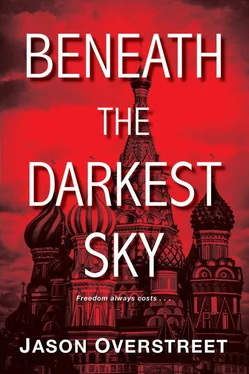When we got to the doorway at the left of the drive, which was under an archway, a butler welcomed us and we entered a rather small, high-ceilinged foyer decorated with Empire-style furniture and paintings. Even the arched ceiling was painted with some type of Empire theme. Bright color was everywhere, save for the dark green columns directly in front of us that separated the foyer from what looked like a lounge. Decorative columns were an obvious motif at Spaso, both externally and internally. They were beautiful.
“We have an appointment with Ambassador Bullitt,” said Bobby. “He’s expecting us. I’m Bobby Ellington and this is my aide, Prescott Sweet.”
“Ah, yes,” said the tall, brown-haired butler in a French-sounding accent. “This way, gentlemen.”
We followed him through the foyer and into the lounge. Heading to the right, we walked up a long, shallow stairway, which was covered with wine-colored carpet. The pristine white walls were decorated with framed pictures of various American dignitaries, and the white-painted railing looked impeccable. The wine against white everywhere was pleasing to the eyes.
As we finished climbing and landed at what was essentially an upper lobby, another set of stairs could be seen straight ahead. I assumed they led up to the sleeping quarters. To our left was one of the grandest chandelier rooms one could imagine. It was massive, with a high, arched ceiling and columns decorating the entire room. An old, czarist-looking rug covered the wood floor, and the chandelier hanging in the middle of the room was truly grand.
As the butler turned to the right into another impressive section adjacent to the chandelier room, we stopped, still caught up in admiring the glistening, hanging centerpiece.
“Ah, yes,” said the butler. “That is the largest chandelier in all of Moscow. It is made of bronze and crystal.”
“It’s magnificent,” said Bobby.
“Shall we, gentlemen?” the butler said. “The ambassador’s study is this way.”
We turned and followed him to the right, and then again to the left, into an impressive room with a stunning fireplace. Standing at the window was a handsome man—thin, medium height, intense—a cigarette in his hand. Sitting on the floor next to him was a small white dog.
“Mr. Bullitt,” said the butler, “your guests are here.”
“Ah, Bobby!” said a smiling Bullitt, turning and approaching, the two shaking hands. “It’s wonderful to see you again.”
“Great to see you as well, William,” said Bobby. “This is my assistant and interpreter, Prescott Sweet. The man I told you about who was so vital to all of us in Haiti.”
“Ah, yes,” said William.” We shook. “It’s a pleasure. Welcome, Prescott.”
“Thank you, sir,” I said, noticing his receding dark hair.
“Please, both of you, come and sit,” he said, as the three of us made ourselves comfortable around his desk. “Don’t mind the dog. It’s my daughter Anne’s West Highland Terrier. Name’s Pie-Pie. Anne is at the Moscow Children’s Theater right now at a rehearsal. Anyway, enough about that. Bobby tells me, Prescott, and only recently, that you’re a man of many languages… and of many technical skills. I should send you straightaway down the hall to help those idiots who are doing measurements for the new ballroom. And I’m serious.”
“Well,” said Bobby, “Press, here, is my ears and mouth for at least—”
“Your own fucking personal interpreter, Bobby?” said William, taking a drag. “I’m the damn ambassador.”
“Yes, you are, sir.”
“Months ago I told you that you could hire whomever you wanted as a personal secretary, but had I been made aware of his acumen for languages up front, I may have tried to hire him for myself.” He turned to me. “It was only two weeks ago, Prescott, that I learned of your translator skills. I should still hire you away from Bobby immediately.”
“I was told,” said Bobby, “that you already had Charles and—”
“I kid, Bobby,” said Bullitt. “My interpreter, Mr. Thayer, is fine. And I’ve also got a new aide who’s great at shorthand and typing. Italian American named Carmel Offie. But these two assistants are not colored like your man Prescott, Bobby. That will certainly be looked upon favorably here in Moscow. And I mean it sincerely. Stalin is actually—”
Bullitt stopped talking and held up his finger for us to wait. He then jotted something down, a rather long something. He finally handed it to Bobby, who read it before handing it to me. It read: Stalin is actually recruiting American Negroes to come study here and work in the factories. They’re being told to leave America’s bigotry behind and come be a part of a truly equal society. It’s a real propaganda coup for him.
“Sounds promising,” said Bobby, while I just nodded and placed the paper on the desk.
“But seriously,” said Bullitt. “We should all be so lucky to have an assistant with your skills, Prescott.”
“Thank you,” I said.
“And I want to be on hand when the locals first get a glimpse of a colored American speaking Russian. He’ll be a star, Bobby. You’ll probably have to hold court so they can get a good glimpse of you in action, Prescott.”
I was reminded once again of my color. Bullitt didn’t feel like an out-and-out racist, but he had quickly made sure to remind me who I was. I was accustomed to such casual, even unintentional barbs back in America. But I had enjoyed being away from them for years in Paris. It was so American. And Bullitt continued.
“There’s a colored American columnist named Homer Smith who I’ve visited with several times here at the embassy. He seems to be trying to report on the Negro situation overall as it relates to living conditions in Moscow versus America. I’ll have to introduce him to you, Prescott.”
“Thank you,” I said, halfheartedly, wondering why I should be so inclined to make this stranger’s acquaintance. “I would love to meet him, Mr. Ambassador.”
“It would suit you to know,” said Bullitt, “that Mr. Stalin and…”
Bullitt, once more, put his finger to his lips, signaling for us to remain quiet. “I like to keep this handy,” he said, opening his desk drawer, pulling out a slip of paper, and passing it along to us again. It read: Sometimes I forget where I am. This room probably has camouflaged wire recorders hidden somewhere. Maybe even behind the walls. We believe the cleaning people are in on it. Found one in the garden last month. Hell, the damn light fixture above may be an actual recording device. After all, they built this house long before we ever arrived. Let’s go take a drive.
He stood and held his arm out, signaling for us to go before him, which we did, as Pie-Pie lagged behind. Once outside, he walked us to a black Lincoln parked in the driveway. “Hurry,” said Bullitt, “before my chauffeur, Stewart, arrives. He’s a U.S. Marine. But I have them dress in civilian clothes.”
He’d barely gotten the door open when a gentleman in a black suit came running from a distant, smaller living quarters. “Where to, Ambassador Bullitt?” he said, half out of breath.
“I think I can handle this one, Stewart,” said Bullitt.
“But, sir, I was—”
“You don’t mind driving, do you, Prescott?” said Bullitt, ignoring the chauffeur. “I’ll direct.”
“Not at all,” I said.
“Good. Listen, Stewart, can you make sure my little roadster is washed and waxed while we’re gone? I want to take it for a drive this weekend.”
“Certainly, sir.”
We hopped in the Lincoln and I took the wheel, the two of them sitting in back so they could chat.
“Back out and take a right, Prescott,” said Bullitt. “Then I’ll point you where to turn a few times so we can get to Smolen-skaya Naberezhnaya Street. We actually just call it ‘Smo Nab Street’ to avoid biting our tongues off. Such is the case with many of the street names. Anyway, from there we’ll make our way to where we can get a nice view of the Moscow River.”
Читать дальше











